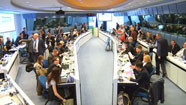On 5 April 2016 the JRC presented the interactive and collaborative online European Energy Efficiency Platform. This beta platform is conceived to fill the gap opened by scattered data and fragmented knowledge resulting from a rapidly growing energy efficiency market. It is expected to be both a one-stop shop for information retrieval and a meeting point for experts to exchange data and reduce redundant activities.
Workshop: Extreme Events and Energy Transitions - Tackling the Challenges of Climate Change by Integrating Social and Complex Systems Science

Motivations
Human activities are causing a general trend of increased interdependence among social-ecological systems of our planet. This situation exposes them to ever more frequent and geographically distributed extreme events (power black-outs, droughts, extended floods, etc.) and poses fundamental energy sustainability challenges to any endeavour aiming to tackle climate change through renewable energies. To increase the current understanding of the phenomena involved and the scope for intervention, it is necessary to consider physical and social processes in combination.
The workshop on extremes and energy transitions has aimed at exploring how the integration of complex system approaches with elements of social organisation and adaptation can enable important advancements in this area.
The event has been organised by Energy Efficiency and Renewables Unit C2 of the Joint Research Centre with speakers from JRC Disaster Risk Management Unit E.1, Lancaster University (UK) and Norwegian University of Science and Technology, Institute for Geosciences and Environmental Research (FR) and University of Padova (IT) and Universitat Autònoma de Barcelona (ES).
Questions explored in the workshop
How can the proposed ideas generate enlightened approaches to research and policy that are necessary to deal with extreme events and energy transition sustainability?
Which strategies and forms of investigation might be necessary to improve the current understanding of how social and physical dimensions of socio-ecological systems interact?
What concrete actions can result from these strategies and investigations, how can they generate advancements in this area and help benefit from a more active contribution of involved communities?
Objectives
The first main objective of the workshop has been to engage researchers and practitioners working in the above mentioned area under a complex systems or social science perspective. This has been done to show the added value of the integration of these perspectives and of new interdisciplinary ways to address the problems at stake.
The second main objective involved stimulating cross-fertilization between the academy and policy area and establishing a network of organisations and research institutes that can continue developing the proposed integration strategies.
The workshop on extremes and energy transitions has addressed these questions by gathering practitioners, PhD students and postdoc/advanced researchers working in the area from both a social and a physical/engineering perspective.




To quote this event use the follonwing format: